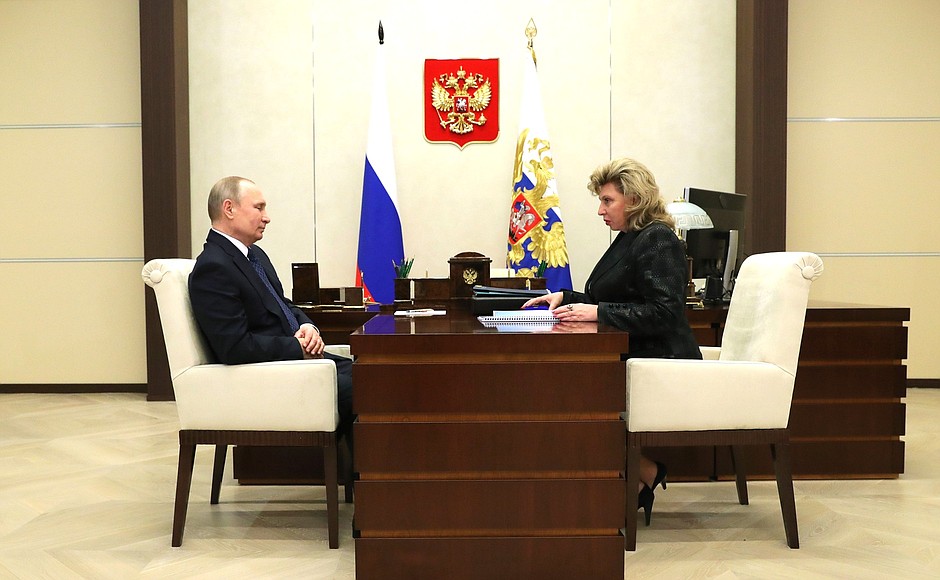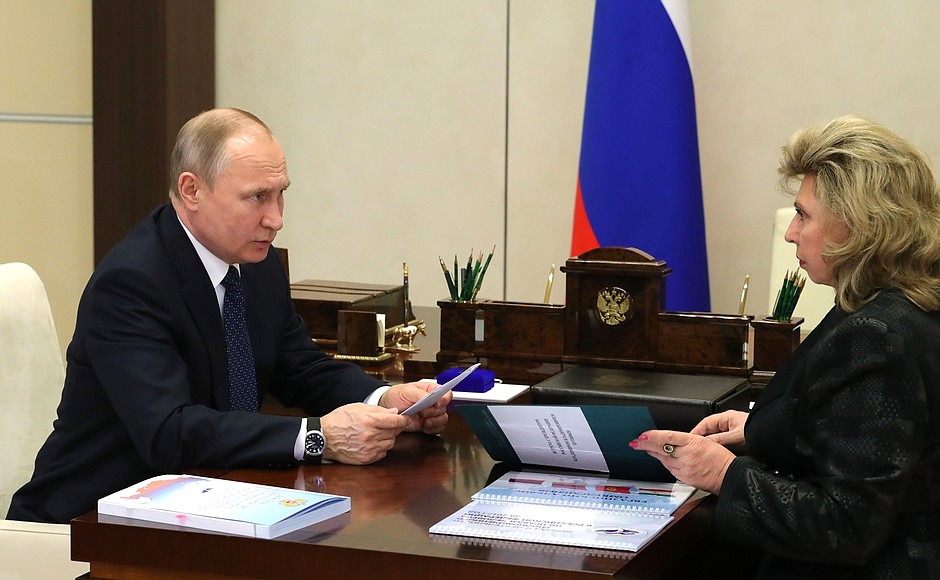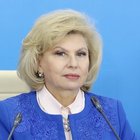President of Russia Vladimir Putin: Ms Moskalkova, you are here to present the annual report.
Human Rights Commissioner Tatyana Moskalkova: You are absolutely right.
But first, I would like to congratulate you on your re-election as the President of Russia. Speaking for myself and also on behalf of human rights commissioners from all the Russian regions, as well as our expert community, I would like to wish you strength of spirit and also, since you are the guarantor of the Constitution and human rights, the fortitude to strengthen democracy, justice and law. And lastly, we wish you to have a good team by your side, personal happiness and reliable support at home.
Vladimir Putin: Thank you, Ms Moskalkova.
Tatyana Moskalkova: Mr President, I would like to present the report of the Human Rights Commissioner for 2017. It is now much bigger and weightier than before. We have added new chapters on human rights in individual groups, an in-depth analysis of the human rights situation and the protection of these rights, with concrete examples, conclusions as well as recommendations, including for the Government, the supreme judicial authorities and our governors. I hope this report will help you to deal with both economic and political matters.
We have revealed an interesting regularity. We have conducted our first serious analysis of the number of human rights appeals in the regions. We have compiled an index and found that it directly depend on social tension and emergencies that result in large-scale and numerous violations of human rights.
I am presenting you with a symbolic memory card with our report together with 7,000 pages of material that contains detailed information for all the Russian regions. Why did I say that it is a symbolic memory card? Because the interactive human rights card has become available to everyone on the website of the Human Rights Commissioner this year, and it is extremely popular. It is a platform for exchanging experience and for creating new technology.
Vladimir Putin: I see that the structure of complaints remains the same. Most of them concern criminal and procedural law; housing legislation comes second and the criminal and penal law takes third position. These are three matters that concern people the most. The last one is labour legislation.
Tatyana Moskalkova: Yes, this is correct. If we combine labour, education and healthcare, then social matters dominate the picture, just as it was last year.
But I must say that the situation has improved somewhat when it comes to public opinion. This can be seen in addresses to the Human Rights Commissioner, and in surveys conducted by the Public Opinion Fund. We can see that the people’s attitude towards human rights has stabilised, it is more positive now and it has even improved.
Last time I raised a series of pressing questions related to foreign currency mortgage borrowers, labour relations, the difficulties in the registration of former Ukrainian military personnel in Crimea, and Baikonur. I would like to say that pursuant to your instructions all of these matters have been resolved.
A large interdepartmental group was established, I am a member of it together with the employees of the Government Staff. Thanks to our efforts, 1,300 people who faced eviction did not lose their flats. We considered every case individually, took into account whether it was the only roof over their head, if they were in a difficult situation and if they required the help of the state. At your initiative, a fund was established and it operated well. Not everybody was satisfied with the solution of their problems, but 1,300 people would like to thank you for such an approach to their human rights problems.
Your executive order regarding Crimea, where the registration of former Ukrainian military personnel had been impossible, has solved the problem. All military personnel now can be registered with military commissariats and they are again included on the waiting list for housing. This is a very positive result. As for Baikonur and the other many issues, there are positive developments, as well. But, unfortunately, we did not succeed in solving all the problems.
As you said, the matter of social protection, especially delays in salary payment to personnel, are dominating. Today, every tenth complaint regarding labour relations is a complaint filed by a work-group. We managed to almost double the efficiency of our work, launch instruments and reinstate the rights of citizens who did not receive pay, in particular, at the Baikonur Space Centre. With your participation and that of the Defence Ministry and local commissioners, we helped over 4,000 people who had not received any wages because the companies they worked for went bankrupt.
I have prepared an address for you. After analysing the issue of non-compliance with labour obligations to personnel, we came to the conclusion that it often happens that company owners bear no responsibility for their workers while having good real estate and significant funds.
Vladimir Putin: We are witnessing the same in the area of finance: bank owners bear no responsibility in the case of a bad scenario and the bankruptcy of their banks. We have to analyse very carefully this practice and find ways to correct it, so that all members of the process would be responsible and strive to meet their obligations to their clients and employees. It is a very serious, large matter we need to keep working on.
<…>


